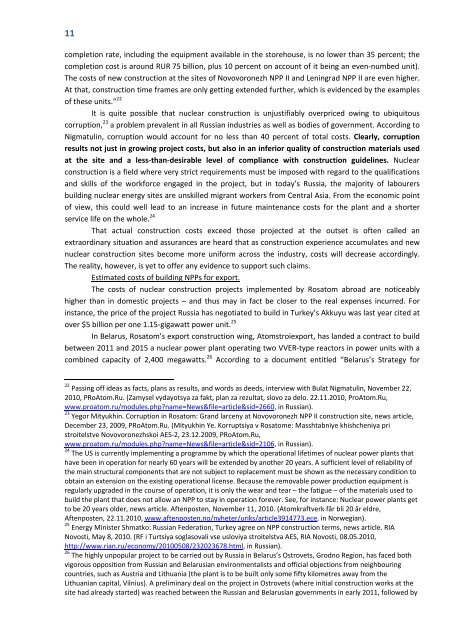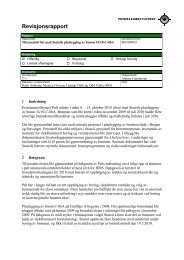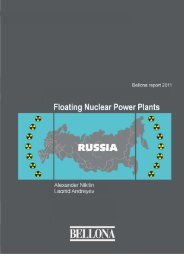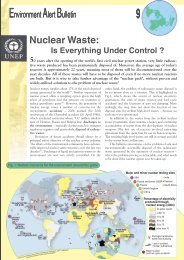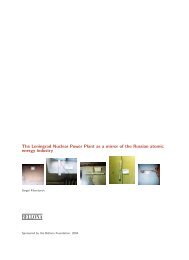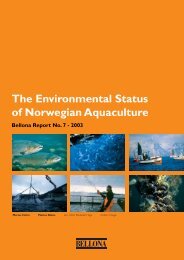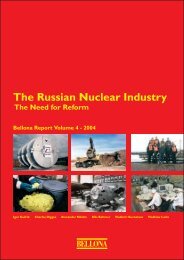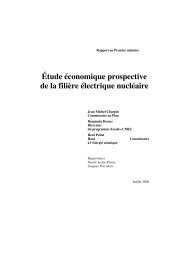10Real costs <strong>of</strong> nuclear power plants under construction today or completed recently.<strong>The</strong>se are almost always greater than estimates calculated at <strong>the</strong> start <strong>of</strong> construction.Fur<strong>the</strong>rmore, construction costs keep growing rapidly. For instance, in October 2006, <strong>the</strong> cost <strong>of</strong>building one standard power unit with a reactor <strong>of</strong> <strong>the</strong> VVER‐1000 series was $2.3 billion, countinginflation calculated for <strong>the</strong> entire construction period. 13 However, according to <strong>the</strong> St. Petersburg‐basednews agency PRoAtom.Ru, Reactor Unit 3 <strong>of</strong> Kalinin NPP 14 and Reactor Unit 2 <strong>of</strong> Rostov (Volgodonsk)NPP 15 each cost over $4 billion. 16<strong>The</strong> estimated cost <strong>of</strong> remaining works at Reactor Unit 5 <strong>of</strong> Kursk NPP, 17 which had beencompleted to 70 percent when construction ground to a halt in <strong>the</strong> early 2000s, was over RUR 47 billion($1.56 billion); that makes over $5 billion per kilowatt in total construction costs.Total construction costs are impacted both by <strong>the</strong> rising costs <strong>of</strong> items on <strong>the</strong> expenditure listand delays in construction. For instance, <strong>the</strong> estimated costs <strong>of</strong> <strong>the</strong> second line <strong>of</strong> construction atLeningrad NPP 18 (Leningrad NPP II) doubled in 2009 alone, according to prices as per <strong>the</strong> renegotiatedcontracts. Likewise, <strong>the</strong> cost <strong>of</strong> completing Unit 4 <strong>of</strong> Kalinin NPP is almost double that <strong>of</strong> <strong>the</strong> initialestimates. Commissioning deadlines have been pushed back by three or four years at <strong>the</strong> least for <strong>the</strong>second units <strong>of</strong> both Leningrad NPP II and Novovoronezh NPP II. 19 <strong>The</strong>se delays will increase <strong>the</strong>construction costs <strong>of</strong> both units by a minimum <strong>of</strong> 20 percent. 20Speaking with <strong>the</strong> news agency PRoAtom.Ru in 2010, Bulat Nigmatulin, former Minister <strong>of</strong>Atomic Energy and now first deputy director <strong>of</strong> <strong>the</strong> Moscow‐based Institute <strong>of</strong> Natural MonopolyProblems, said: “With regard to completing Unit 2 <strong>of</strong> Rostov NPP – <strong>the</strong> “paired” one, which is 20 percentcheaper than a new odd‐numbered one – <strong>the</strong> cost <strong>of</strong> one kilowatt <strong>of</strong> installed capacity [was] $4,000 inprices re‐calculated for <strong>the</strong> resumed construction (construction works were resumed in 2005 21 ; overallpower plant. Thus, <strong>the</strong> cost <strong>of</strong> power line construction should probably be added to <strong>the</strong> capital cost <strong>of</strong> <strong>the</strong> plantitself.13 Federal Target Programme “Development <strong>of</strong> <strong>the</strong> <strong>Russian</strong> <strong>Nuclear</strong> Energy <strong>Industry</strong> in 2007 to 2010 andDevelopment Prospects to 2015.” (http://fcp.vpk.ru/cgi‐bin/cis/fcp.cgi/Fcp/ViewFcp/View/2008/227/, in <strong>Russian</strong>).14 Kalinin NPP is located some 200 kilometres northwest <strong>of</strong> Moscow, in Tver Region in Central European Russia. Formore information, please see Rosenergoatom’s page athttp://www.knpp.rosenergoatom.ru/wps/wcm/connect/rosenergoatom/knpp_en/ and <strong>Bellona</strong>’s coverage athttp://www.bellona.org/subjects/1140452716.22. – Translator.15 Rostov (Volgodonsk) NPP is located on <strong>the</strong> Don River in Rostov Region, Sou<strong>the</strong>rn Russia. For more information,please see Rosenergoatom’s page athttp://www.vnpp.rosenergoatom.ru/wps/wcm/connect/rosenergoatom/vnpp_en/ and <strong>Bellona</strong>’s coverage athttp://www.bellona.org/subjects/1140452976.81. – Translator.16 “To distinguish defeat from victory,” an open letter by Bulat Nigmatulin, first deputy director <strong>of</strong> <strong>the</strong> Institute <strong>of</strong>Natural Monopoly Problems, to Rosatom head Sergei Kiriyenko, March 29, 2010, PRoAtom.Ru (Otlichatporazheniye ot pobedy, 29.03.2010, PRoAtom.Ru,http://www.proatom.ru/modules.php?name=News&file=article&sid=2252, in <strong>Russian</strong>).17 Kursk NPP is in Kursk Region in Western Russia. Construction <strong>of</strong> Unit 5 <strong>of</strong> <strong>the</strong> plant was halted and resumed anumber <strong>of</strong> times since it began in 1985. For more information, please see Rosenergoatom’s page athttp://www.kunpp.rosenergoatom.ru/wps/wcm/connect/rosenergoatom/kunpp_en/ and <strong>Bellona</strong>’s coverage athttp://www.bellona.org/subjects/1140452778.25. – Translator.18 Leningrad NPP is located in <strong>the</strong> town <strong>of</strong> Sosnovy Bor near St. Petersburg. For more information, please seeRosenergoatom’s page at http://www.lennpp.rosenergoatom.ru/wps/wcm/connect/rosenergoatom/lennpp_en/and <strong>Bellona</strong>’s coverage at http://www.bellona.org/subjects/1140452784.53. – Translator.19 Novovoronezh NPP is in Voronezh Region, Central European Russia. A second line <strong>of</strong> construction is under way at<strong>the</strong> site, with <strong>the</strong> start <strong>of</strong> commercial operation planned for 2012. For more information, please see <strong>Bellona</strong>’scoverage at http://www.bellona.org/subjects/1140452957.64 or Rosenergoatom’s page athttp://www.novnpp.rosenergoatom.ru/wps/wcm/connect/rosenergoatom/novnpp_en/. – Translator.20 See Footnote 16.21 Initial construction was started on Unit 2 <strong>of</strong> Rostov NPP in 1983. <strong>The</strong> unit was completed in 2009 andcommissioned for commercial operation in December 2010. – Translator.
11completion rate, including <strong>the</strong> equipment available in <strong>the</strong> storehouse, is no lower than 35 percent; <strong>the</strong>completion cost is around RUR 75 billion, plus 10 percent on account <strong>of</strong> it being an even‐numbed unit).<strong>The</strong> costs <strong>of</strong> new construction at <strong>the</strong> sites <strong>of</strong> Novovoronezh NPP II and Leningrad NPP II are even higher.At that, construction time frames are only getting extended fur<strong>the</strong>r, which is evidenced by <strong>the</strong> examples<strong>of</strong> <strong>the</strong>se units.” 22It is quite possible that nuclear construction is unjustifiably overpriced owing to ubiquitouscorruption, 23 a problem prevalent in all <strong>Russian</strong> industries as well as bodies <strong>of</strong> government. According toNigmatulin, corruption would account for no less than 40 percent <strong>of</strong> total costs. Clearly, corruptionresults not just in growing project costs, but also in an inferior quality <strong>of</strong> construction materials usedat <strong>the</strong> site and a less‐than‐desirable level <strong>of</strong> compliance with construction guidelines. <strong>Nuclear</strong>construction is a field where very strict requirements must be imposed with regard to <strong>the</strong> qualificationsand skills <strong>of</strong> <strong>the</strong> workforce engaged in <strong>the</strong> project, but in today’s Russia, <strong>the</strong> majority <strong>of</strong> labourersbuilding nuclear energy sites are unskilled migrant workers from Central Asia. From <strong>the</strong> economic point<strong>of</strong> view, this could well lead to an increase in future maintenance costs for <strong>the</strong> plant and a shorterservice life on <strong>the</strong> whole. 24That actual construction costs exceed those projected at <strong>the</strong> outset is <strong>of</strong>ten called anextraordinary situation and assurances are heard that as construction experience accumulates and newnuclear construction sites become more uniform across <strong>the</strong> industry, costs will decrease accordingly.<strong>The</strong> reality, however, is yet to <strong>of</strong>fer any evidence to support such claims.Estimated costs <strong>of</strong> building NPPs for export.<strong>The</strong> costs <strong>of</strong> nuclear construction projects implemented by Rosatom abroad are noticeablyhigher than in domestic projects – and thus may in fact be closer to <strong>the</strong> real expenses incurred. Forinstance, <strong>the</strong> price <strong>of</strong> <strong>the</strong> project Russia has negotiated to build in Turkey’s Akkuyu was last year cited atover $5 billion per one 1.15‐gigawatt power unit. 25In Belarus, Rosatom’s export construction wing, Atomstroiexport, has landed a contract to buildbetween 2011 and 2015 a nuclear power plant operating two VVER‐type reactors in power units with acombined capacity <strong>of</strong> 2,400 megawatts. 26 According to a document entitled “Belarus’s Strategy for22 Passing <strong>of</strong>f ideas as facts, plans as results, and words as deeds, interview with Bulat Nigmatulin, November 22,2010, PRoAtom.Ru. (Zamysel vydayotsya za fakt, plan za rezultat, slovo za delo. 22.11.2010, ProAtom.Ru,www.proatom.ru/modules.php?name=News&file=article&sid=2660, in <strong>Russian</strong>).23 Yegor Mityukhin. Corruption in Rosatom: Grand larceny at Novovoronezh NPP II construction site, news article,December 23, 2009, PRoAtom.Ru. (Mityukhin Ye. Korruptsiya v Rosatome: Masshtabniye khishcheniya pristroitelstve Novovoronezhskoi AES‐2, 23.12.2009, PRoAtom.Ru,www.proatom.ru/modules.php?name=News&file=article&sid=2106, in <strong>Russian</strong>).24 <strong>The</strong> US is currently implementing a programme by which <strong>the</strong> operational lifetimes <strong>of</strong> nuclear power plants thathave been in operation for nearly 60 years will be extended by ano<strong>the</strong>r 20 years. A sufficient level <strong>of</strong> reliability <strong>of</strong><strong>the</strong> main structural components that are not subject to replacement must be shown as <strong>the</strong> necessary condition toobtain an extension on <strong>the</strong> existing operational license. Because <strong>the</strong> removable power production equipment isregularly upgraded in <strong>the</strong> course <strong>of</strong> operation, it is only <strong>the</strong> wear and tear – <strong>the</strong> fatigue – <strong>of</strong> <strong>the</strong> materials used tobuild <strong>the</strong> plant that does not allow an NPP to stay in operation forever. See, for instance: <strong>Nuclear</strong> power plants getto be 20 years older, news article. Aftenposten, November 11, 2010. (Atomkraftverk får bli 20 år eldre,Aftenposten, 22.11.2010, www.aftenposten.no/nyheter/uriks/article3914773.ece, in Norwegian).25 Energy Minister Shmatko: <strong>Russian</strong> Federation, Turkey agree on NPP construction terms, news article. RIANovosti, May 8, 2010. (RF i Turtsiya soglasovali vse usloviya stroitelstva AES, RIA Novosti, 08.05.2010,http://www.rian.ru/economy/20100508/232023678.html, in <strong>Russian</strong>).26 <strong>The</strong> highly unpopular project to be carried out by Russia in Belarus’s Ostrovets, Grodno Region, has faced bothvigorous opposition from <strong>Russian</strong> and Belarusian environmentalists and <strong>of</strong>ficial objections from neighbouringcountries, such as Austria and Lithuania (<strong>the</strong> plant is to be built only some fifty kilometres away from <strong>the</strong>Lithuanian capital, Vilnius). A preliminary deal on <strong>the</strong> project in Ostrovets (where initial construction works at <strong>the</strong>site had already started) was reached between <strong>the</strong> <strong>Russian</strong> and Belarusian governments in early 2011, followed by
- Page 2 and 3: …Nuclear power generation is the
- Page 4 and 5: Translator’s notes:Rules of etiqu
- Page 6 and 7: 6ForewordThe economy of the Russian
- Page 8 and 9: 8of everything that the nuclear pow
- Page 12 and 13: 12Energy Potential Development,”
- Page 14 and 15: 14noticeably higher than the regula
- Page 16 and 17: 16came to 2.2 billion kilowatt‐ho
- Page 18 and 19: 183. Problems of nuclear power indu
- Page 20 and 21: 20requirements: If a wrong decision
- Page 22 and 23: 22Property and liability insurance;
- Page 24 and 25: 24Depreciation 10,911,630 9,312,654
- Page 26 and 27: 26low prices, because a decrease in
- Page 28 and 29: 28Fig. 2. Spot prices for U 3 O 8 c
- Page 30 and 31: 30uranium needs and the demand it h
- Page 32 and 33: 32remains unclear what can be done
- Page 34 and 35: 34For instance, British energy comp
- Page 36 and 37: 36But Rosenergoatom’s real expens
- Page 38 and 39: 38contribution benefit plans, inclu
- Page 40 and 41: 40Table 11. Costs of decommissionin
- Page 42 and 43: 42And thirdly, traditional approach
- Page 44 and 45: 44The discount rate will be the var
- Page 46 and 47: 46Cost ofcapitalTable 15. Price of
- Page 48 and 49: 48operation as a baseload generatin
- Page 50 and 51: 505 percent0 percent367.0 614.3 3.7
- Page 52 and 53: 52The idea to develop the sector of
- Page 54 and 55: 54Even if we assume that the direct
- Page 56 and 57: 56Furthermore, the total cost of bu
- Page 58 and 59: 5811. Instructional guidelines for
- Page 60:
60Greenpeace, 01.04.2004,http://www


